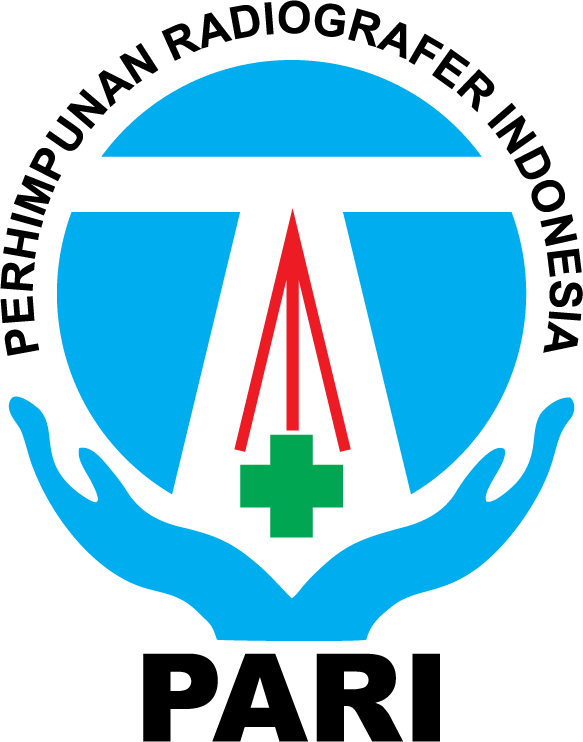Efektifitas Variasi Window Width Terhadap Informasi Anatomi CT Scan Sinus Paranasal Citra Jaringan Lunak Pada Kasus Sinusitis
Abstract
Background: Selection window width (WW) and window level (WL) must be precise to produce an optimal overview of anatomical information on CT scan paranasal sinuses soft tissue window in case of sinusitis. WW affects controlling contrast resolution. A wide window width will appear the less contrast of image. The aim of the study is to know the difference in anatomical information with variation WW and to know the most optimal WW value for CT scan paranasal sinuses soft tissue window in case of sinusitis.
Methods: The research design is a quantitative experimental study, using WW variations (90, 120, 200, 350, 400). Anatomical assessment of osteomeatal unit, agger nasi cell, ethmoid roof, onodi cells, sphenoid sinus, optic nerve, middle turbinate, uncinate process, haller cells, And ethmoidal bulla. The friedman test is used to know a significant difference and the highest value of mean rank to know the most optimal WW value.
Results: There is difference in information on each anatomical object with a significance value of < 0.05 and there is difference in the total information on anatomical object with a significance value of 0.000 <0.05. WW 120 is most optimal to display osteomeatal unit, agger nasi cell, ethmoid roof, onodi cells, middle turbinate, uncinate process, and ethmoidal bulla. WW 90 is most optimal to display sinus sphenoidalis, optic nerve, and haller cells.
Conclusions: WW 120 is most optimal to display total anatomical information on CT scan paranasal sinuses soft tissue window in case of sinusitis.
Keywords
Full Text:
PDFReferences
Cebula, M., Nowak, M. D., & Modlińska, S. (2017). Impact of window computed tomography (CT) parameters on measurement of inflammatory changes in paranasal sinuses. Polish Journal of Radiology, 82(L), 567–570. DOI: 10.1001/jama.2015.19330
Demaio, D. N. (2018). Mosby’s Exam Review for Computed Tomography THIRD EDITION. Elsevier: St. Louis, Missouri.
Devareddy, M. M., & Devakar, S. (2019). Evaluation of anatomical variations in nose and paranasal sinuses by using multidetector computed tomography. International Journal of Contemporary Medicine, Surgery and Radiology, 4(3), 146–151. DOI: http://dx.doi.org/10.21276/ijcmsr.2019.4.3.3
Gaikwad, R. D. (2017). MAXILLARY SINUS ANTRUM OF HIGHMORE (1st ed.). LAP LAMBERT Academic Publishing: Beau Bassin, Mauritius.
Kandukuri, R., & Phatak, S. (2016). Evaluation of sinonasal diseases by computed tomography. Journal of Clinical and Diagnostic Research, 10(11), TC09-TC12. DOI: 10.7860/JCDR/2016/23197.8826
Lampignano, J. P., & Kendrick, L. E. (2018). Bontrager’s TEXTBOOK of RADIOGRAPHIC POSITIONING and RELATED ANATOMY (Ninth Edition). Elsevier: St. Louis, Missouri.
Long, B. W., Rollins, J., & Smith, B. (2016). MERRILL’S ATLAS OF RADIOGRAPHIC POSITIONING & PROCEDURES (Thirteenth Edition). Elsevier: St. Louis, Missouri.
Mafee, M. F., Farid, N., & Lim, W. Y. (2014). Imaging of the paranasal sinuses: Plain-Film Radiography, Computed Tomography, and Magnetic Resonance Imaging, 295–322. DOI: 10.1007/978-1-4939-0265-1_17
Pawar, S. S., & Bansal, S. (2018). CT Anatomy of Paranasal Sinuses –
Correlation with Clinical Sinusitis. International Journal of Contemporary Medical Research [IJCMR], 5(4), 13–15. DOI: 10.21276/ijcmr.2018.5.4.13
Romans, L. E. (2018). Computed tomography for technologists: A comprehensive text (second edition). Lippincott Williams & Wilkins, a Wolters Kluwer business: Baltimore.
Seeram, E. (2016). Computed Tomography Physical Principles, Clinical Applications, and Quality Control (Fourth Edition). Elsevier: St. Louis, Missouri.
DOI: https://doi.org/10.31983/jimed.v9i2.10330
Article Metrics
Refbacks
- There are currently no refbacks.
JURNAL IMEJING DIAGNOSTIK by http://ejournal.poltekkes-smg.ac.id/ojs/index.php/jimed is licensed under a Creative Commons Attribution-ShareAlike 4.0 International License.

.png)
.png)
.png)
.png)
.png)
.png)
.png)











